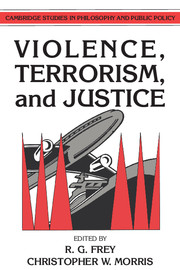Book contents
- Frontmatter
- Contents
- List of contributors
- Preface
- 1 Violence, terrorism, and justice
- 2 What purposes can “international terrorism” serve?
- 3 Violent demonstrations
- 4 Terrorism, rights, and political goals
- 5 The political significance of terrorism
- 6 Terrorism and morality
- 7 Which are the offers you can't refuse?
- 8 Making exceptions without abandoning the principle: or how a Kantian might think about terrorism
- 9 State and private; Red and White
- 10 State terrorism
- 11 Nuclear hostages
- 12 Rape as a terrorist institution
1 - Violence, terrorism, and justice
Published online by Cambridge University Press: 05 June 2012
- Frontmatter
- Contents
- List of contributors
- Preface
- 1 Violence, terrorism, and justice
- 2 What purposes can “international terrorism” serve?
- 3 Violent demonstrations
- 4 Terrorism, rights, and political goals
- 5 The political significance of terrorism
- 6 Terrorism and morality
- 7 Which are the offers you can't refuse?
- 8 Making exceptions without abandoning the principle: or how a Kantian might think about terrorism
- 9 State and private; Red and White
- 10 State terrorism
- 11 Nuclear hostages
- 12 Rape as a terrorist institution
Summary
Unless one is a pacifist, one is likely to find it relatively easy to think of scenarios in which the use of force and violence against others is justified. Killing other people in self-defense, for example, seems widely condoned, but so, too, does defending our citizens abroad against attack from violent regimes. Violence in these cases appears reactive, employed to defeat aggression against or violence toward vital interests. Where violence comes to be seen as much more problematic, if not simply prohibited, is in its direct use for social/political ends. It then degenerates into terrorism, many people seem to think, and terrorism, they hold, is quite wrong. But what exactly is terrorism? And why is it wrong?
Most of us today believe terrorism to be a serious problem, one that raises difficult and challenging questions. The urgency of the problem, especially to North Americans and Western Europeans, may appear to be that terrorism is an issue that we confront from outside – that, as it were, it is an issue for us, not because violence for political ends is something approved of in our societies, but because we are the objects of such violence. The difficulty of the questions raised by contemporary terrorism has to do, we may suppose, with the complexity of issues having to do with the use of violence generally for political ends. The first question, that of the proper characterization of terrorism, is difficult, in part because it is hard to separate from the second, evaluative question, that of the wrongness of terrorism.
- Type
- Chapter
- Information
- Violence, Terrorism, and Justice , pp. 1 - 17Publisher: Cambridge University PressPrint publication year: 1991

